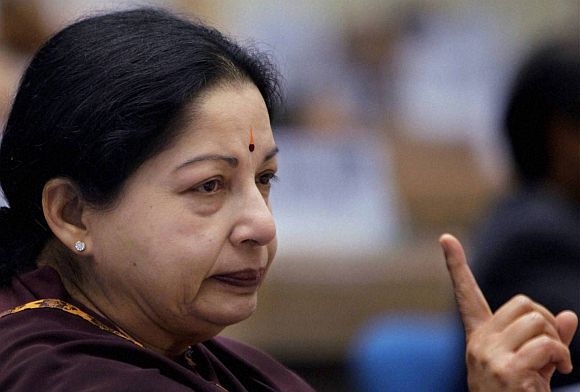The sops sanctioned by J Jayalalithaa on her first day in office could cost the exchequer up to Rs 8,000 crore annually. T E Narasimhan reports.

On May 23, after taking oath as the chief minister of Tamil Nadu for the sixth time, J Jayalalithaa drove straight to her office and got down to business.
The first five files cleared by her were all about dole: farm loans were waived, free electricity was sanctioned for domestic consumers, free gold was assured for women getting married, liquor shops were regulated and free power was mandated for handloom weavers.
The promise of several freebies, or "essentials", as party workers call them, was the centrepiece of Jayalalithaa's election campaign this time.
She promised mobiles, set-top-boxes, laptops (with internet) for students, and scooters for working women at half the market price, besides salaries for state government employees at par with the Seventh Pay Commission recommendations for Central government staff.
As rival Dravida Munnetra Kazhagam could not come up with a longer list of freebies, Jayalalithaa carried the day: she became the first chief minister of Tamil Nadu in 35 years to win a second consecutive term.
The All India Anna Dravida Munnetra Kazhagam, headed by her, won 134 of the 232 seats in the recent assembly elections.
Setting the tone for her term, Jayalalithaa in the victory speech after the results were announced said: "I will show my gratitude to the people of Tamil Nadu with renewed vigour and fulfil the poll promises made by the party."
The consequences of her generous dole, however, are going to be disastrous for the state exchequer. Together the five schemes cleared by her on the first day of her second term in office will cost Rs 40,000 to 50,000 crore over five years, say experts.
As freebies flow, Tamil Nadu drowns in debt.
"A rough calculation is that it would at least be an additional expenditure of around Rs 8,000 crore a year to the state," says M R Venkatesh, a chartered accountant and an economic policy expert.
This includes over Rs 5,000 crore as a result of the farm loan waiver, Rs 1,608 crore on account on free electricity to households and Rs 19.08 crore due to free power to handloom weavers.
Although well-meaning in its intent, the move to regulate government-owned liquor shops has its downsides too. The chief minister has ordered the closure of 500 liquor outlets located near temples and schools, and has cut business hours for retailers from 12 noon to 10 pm instead of 10 am to 10 pm earlier.
This will render over 1,500 people who were employed in these outlets jobless. It also means a revenue loss of around Rs 300 crore annually in taxes from liquor sales. Currently, the state earns Rs 27,000 crore from alcohol sales annually; so the closure of shops means a reduction of over 1 per cent in the revenue, which may not be much.
The government's gold scheme -- eight grams of gold to women with a diploma degree when they are getting married -- will cost an additional Rs 308 crore.
With the state's public debt already at over Rs 200,000 crore in 2015-16, the cost of playing to the gallery is surely going to be high.
The politics of freebies
Like M Karunanidhi before her, Jayalalithaa has stuck to an extremely narrow view on welfare. Waiving the farm loan, for example, has become something of a ritual for successive governments in the state, regardless of their political affiliations.
Before Jayalalithaa struck off loans last week, the DMK government had waived off loans worth Rs 5,500 crore in 2006 to bring relief to stressed farmers. But besides crystallising support for the ruling dispensation among farmers, there is little to show the loan waiver schemes have had any long-term impact.
Jayalalithaa's order on waiving off co-operative bank loans is expected to cost the exchequer around Rs 5,780 crore, but farmers are sceptical if the benefits will reach the needy.
Mahadanapuram V Rajaram, president of the Cauvery Delta Farmers' Welfare Association, says, "It is good that farm loans have been waived, but only 22 per cent of the farmers have taken loans from co-operatives."
Besides, he adds, the trend of writing off loans every five years only encourages people to wilfully default on repayments in the hope that the government would come to their rescue later.
An official from a co-operative bank says instead of waiving off loans, the government should look at ways to help farmers increase their productivity and income. One way the state can do this, he says, is by roping in cooperatives to distribute free seeds and other essential products.
"This will help both the farming community and the co-operative banks," he adds.
However, that may not be easy. The reliance on freebies to win votes runs deep in Tamil Nadu.
From free rice, colour television sets, mixer-grinders, fans and gold to cows and goats, voters have grown accustomed to being indulged by political parties in return for their support. Over the past decade, the state has spent over Rs 11,500 crore on just three freebies: colour television sets, laptops and household appliances.
Steeped in history
Many trace the roots of the politics of freebies to MG Ramachandran who, as chief minister of the state in 1982, initiated a mid-day meal scheme for school students. But what started as a modest plan to boost the health of school-going children gained a different spin during the term of successive governments.
In 2006, DMK was voted to power largely due to its free television scheme and rice for a token Rs 1. Under the scheme, 15.3 million TV sets were bought and distributed by the government, costing a whopping over Rs 3,600 crore, according to sources.
In 2011, Jayalalithaa-led AIADMK took the freebie concept several notches up with laptops for students, gold for poor educated brides, free mixers, fans, school uniforms, slippers, stipends for students, mobiles for self-help groups and a number of other "poor friendly" programmes, including free supply of mineral water bottles, vegetables, salt and tea.
In 2011, the state's debt was Rs 1,01,349 crore, but at the end of 2014-15 it reached Rs 1,81,036 crore and it is set to increase to Rs 2,11,483 crore in 2015-16.
Tamil Nadu Finance Minister O Panneerselvam says in reference to the state's rising debt, "The people are assured that our chief minister will take every possible step to ensure that they do not suffer the pain of high inflation."
Adds Finance Secretary K Shanmugam: "Helping the needy should not be counted as wasteful expenditure by the state, it is part of our social responsibility."
Charity clearly has no limits in Tamil Nadu.











